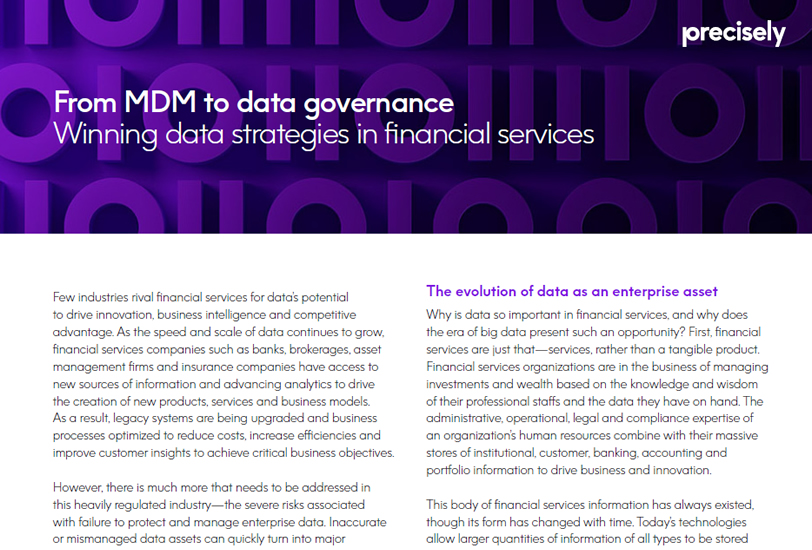White Paper
From MDM to Data Governance
Winning MDM data strategies in financial services
Few industries rival financial services for data’s potential to drive innovation, business intelligence and competitive advantage. As the speed and scale of data continues to grow, financial services companies such as banks, brokerages, asset management firms and insurance companies have access to new sources of information and advancing analytics to drive the creation of new products, services and business models. As a result, legacy systems are being upgraded and business processes optimized to reduce costs, increase efficiencies and improve customer insights to achieve critical business objectives.
However, there is much more that needs to be addressed in this heavily regulated industry—the severe risks associated with failure to protect and manage enterprise data. Inaccurate or mismanaged data assets can quickly turn into major data liabilities with widespread negative organizational and reputational impact, which affirms the critical need for properly governed, high quality data.
This represents a significant change in culture— the paradigm of data as an asset and data governance as an enterprise-wide practice is something that companies have often found easier said than done.
For example, consider the enormous amounts of customer data that financial institutions have on hand that could reveal opportunities to sell new products or services, personalize the customer experience or reduce customer churn. Is this data being mined for insights or simply being stored? The problem is that data has a shelf life with an expiration date. The longer it sits unused, the less likelihood it will reveal meaningful insights that can be acted upon to achieve a competitive advantage.
The evolution of data as an enterprise asset
Why is data so important in financial services, and why does the era of big data present such an opportunity? First, financial services are just that—services, rather than a tangible product. Financial services organizations are in the business of managing investments and wealth based on the knowledge and wisdom of their professional staffs and the data they have on hand. The administrative, operational, legal and compliance expertise of an organization’s human resources combine with their massive stores of institutional, customer, banking, accounting and portfolio information to drive business and innovation.
Read this whitepaper to learn more about how a company’s MDM data governance initiative will be successful both in mitigating the risks of poor data management and by utilizing its data assets.
